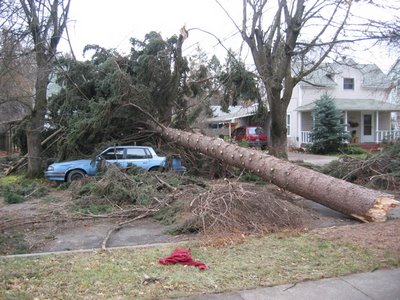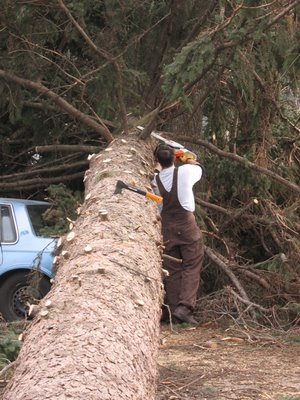 We had a second severe windstorm in the Pacific Northwest. This windstorm was much more severe, and caused over a million people in the NW to lose power for a long period of time. In fact, my family and I lost power for several hours during the storm.
We had a second severe windstorm in the Pacific Northwest. This windstorm was much more severe, and caused over a million people in the NW to lose power for a long period of time. In fact, my family and I lost power for several hours during the storm.The picture above shows my friend Peter standing by some larch logs and the trailer. Peter is holding the log carrier in this picture.
This windstorm felled a lot of trees...not just in town but all over the rural countryside throughout Latah county. Many trees were uprooted, some were snapped at the base. Some are still leaning precariously.
I've become very serious in recent days about collecting these "windfall" logs. With the help of my friend Peter, I've collected 17 logs in a two-day period!! I've collected ponderosa pine, grand fir, western larch, and lodgepole pine. Armed with a couple of Peaveys, a wood-handled log carrier, and a come-along, we managed to brute force and finesse 17 logs of different weights and diameters onto my trailer and ultimately to the sawmill. I instantly went from being horribly behind in my log-collecting status to being comfortably on-schedule again. I estimate that I now have about 35% of the total logs that I will need for my cabin. The wood is all very good quality...the sheer number of downed trees has allowed me to be picky.
This windstorm felled a lot of trees...not just in town but all over the rural countryside throughout Latah county. Many trees were uprooted, some were snapped at the base. Some are still leaning precariously.
I've become very serious in recent days about collecting these "windfall" logs. With the help of my friend Peter, I've collected 17 logs in a two-day period!! I've collected ponderosa pine, grand fir, western larch, and lodgepole pine. Armed with a couple of Peaveys, a wood-handled log carrier, and a come-along, we managed to brute force and finesse 17 logs of different weights and diameters onto my trailer and ultimately to the sawmill. I instantly went from being horribly behind in my log-collecting status to being comfortably on-schedule again. I estimate that I now have about 35% of the total logs that I will need for my cabin. The wood is all very good quality...the sheer number of downed trees has allowed me to be picky.
To the left is my friend Peter who is marking 14' sections on two felled Ponderosa Pine trees which were uprooted in the windstorm.
I would like to get some more larch and douglas fir. I've now got plenty of spruce and pine, which will look good but have less than terrific mechanical properties. For my tiny structure, it shouldn't matter much.
My 4x4 Jeep has peformed very well as a logging truck. It's capable of hauling logs and a very loaded trailer on top of snow and ice.

Here is a picture of me using a come-along to slowly pull a log onto the trailer. The come-along is the key to manipulating larger logs or putting logs on top of other logs where there is much more friction. I'm now convinced that with a come-along, a block and tackle, and a large lever one can do almost anything!!
To the left is a picture of our first full load of 5 logs. 2 larch, 2 ponderosa pine, and 1 grand fir. I am really curious how much all of these weigh and how much my trailer can truly support..
 To the left is a picture of me using a come-along to pull a large log onto the second layer of logs. This kind of situation is the most time consuming due to the height difference and the extra friction of bark on bark.
To the left is a picture of me using a come-along to pull a large log onto the second layer of logs. This kind of situation is the most time consuming due to the height difference and the extra friction of bark on bark. 












